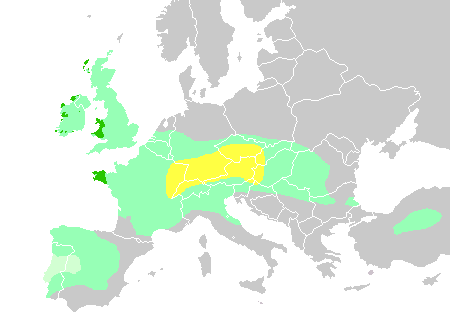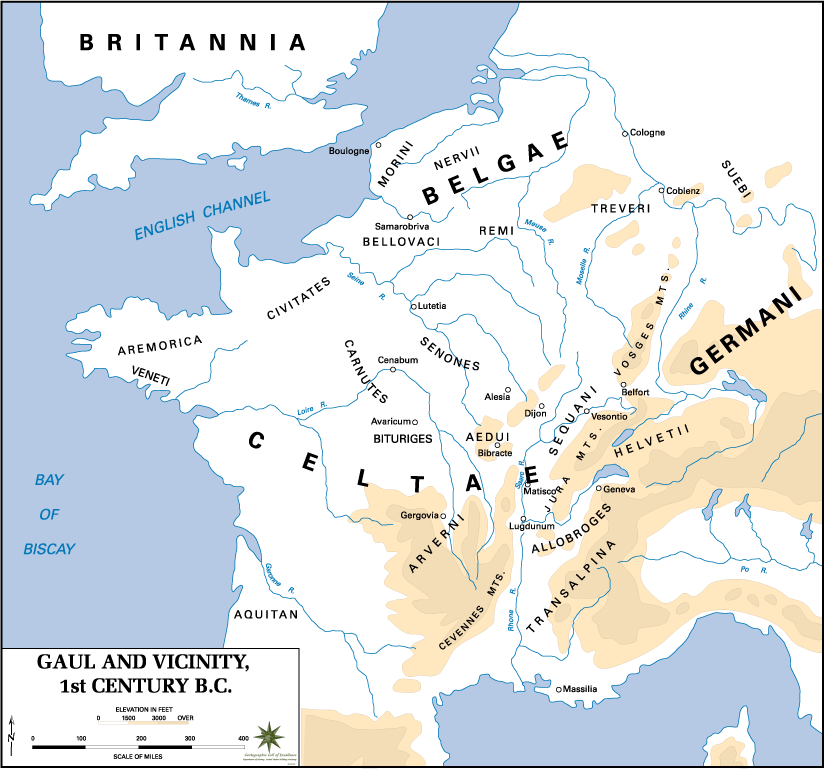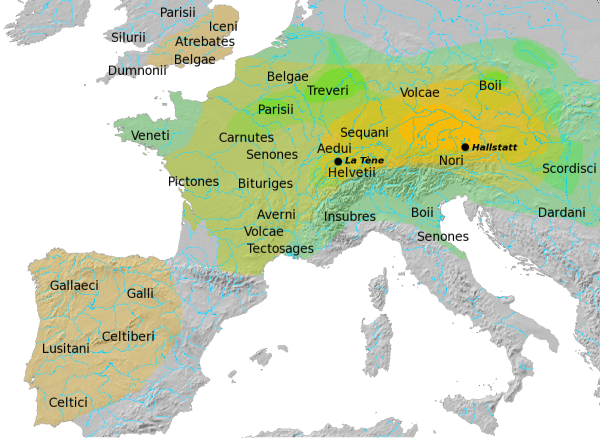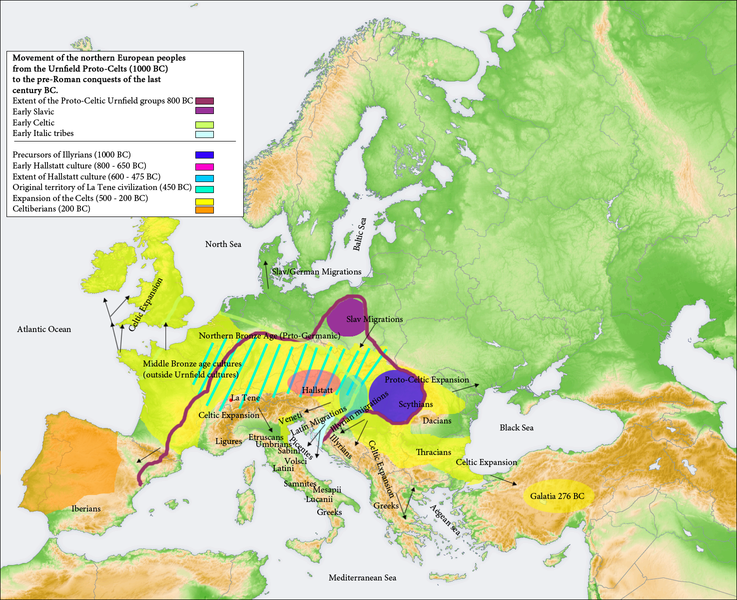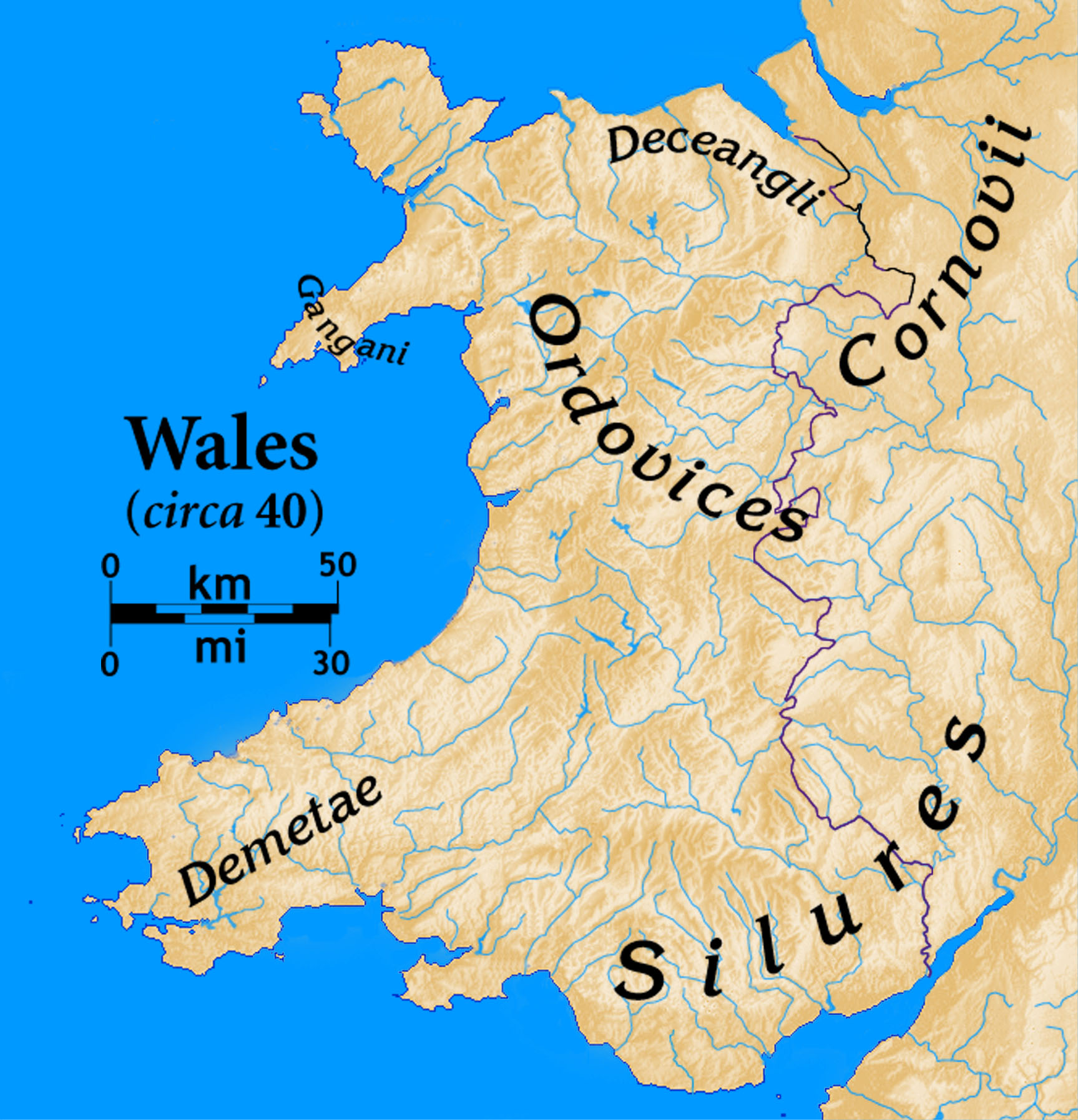I have noticed that in Romanian the name of Wales is Ţara Galilor, which literally means Country of the Gauls or "Gauls-land". I consider this not just unusual, something that is not present in other languages, but an aberration that I (as native speaker of that language) would like to see changed, for reasons that I would have to mention here (in order to clarify my question).
Although I am almost convinced that my opinion is justified, I am also amazed that I have not until now found this topic discussed and argued about in Romanian (and in Romania) by people interested (volens nolens) in this language. So, I hurried up and edited a section on that specific Wikipedia article in Romanian, called A language problem: on being Welsh in the country of the "Gauls where I tried to explain the situation, but the edit was after a while removed because a debated question had no place on Wikipedia.
Here is the translation of that fragment:
The name of Wales in the Romanian language was, it seems, wrongly constructed, by a wrong translation of the French name of the country, Pays de Galles, literally "the country of Wales", as "the country of the Gauls". The error probably comes from a confusion between the terms "gal" (Romanian term for "Gaul person" or "from Gaul") and "galez" (Romanian term for Welsh), facilitated by the phonetic similarity.
The name "Wales", transposed in the Neo-Latin languages, undergoes a transformation by which W is replaced by G (in the same way that the name Wilhelm or William is Guillaume in French and Guillermo in Spanish): Pays de Galles in French, Galles in Italian, Gales in Spanish, País de Gales in Portuguese. The correct form in Romanian should simply be Wales (as in German, Slavic languages and Hungarian) or it could follow the Latin pattern in forms like “Țara Galeză” ("The Welsh Country"), "Țara Galezilor” ("The Country of the Welsh"), "Gales” or even „Galezia”, but by no means "Țara Galilor” (country of the Gauls. The Romanian term “Galez” (Welsh) comes from the French "gallois" (literally, inhabitant of Wales), which doesn’t mean "Gaul" (inhabitant of Gaul, in French, "gaulois"), and yet the name adopted in Romanian for Wales is "Country of the Gauls".
The situation is so ridiculously confusing that the Romanian Wikipedia article on the Welsh people (which are correctly called Galezi, and not Gauls) starts with this phrase (my translation to English):
The Welsh (Cymry in the Welsh language, Welsh in English) are a Celtic people, the native inhabitants of the Country of the Gauls.
Given the absence of any debate that I know of, my certainty about the justification of my opinion is a bit shaky, so I would have to make a good argument. That argument would have to include some elements about the existence of a norm/trend in the construction of the name Wales in languages other than Romanian (and English). Showing that no similar case exists and that there is a norm or trend that Romanian contradicts or simply does not follow would help my case. I am curious whether such a confusion is somehow justified (and thus is more than a confusion) or if it is present in other languages too.
Here are a few notes in anticipation of possible objections:
- Considering the idea that "gal" (Romanian for Gaul people, gaulois in French) and "galez" (Romanian for Welsh, gallois in French) are related, so there is no problem with the form "galezilor" (meaning "of the Gauls"). I have already received an answer by @LаngLаngС which largely dismisses my concerns by emphasizing the fact that these terms (and many others) have etymologically the same root, so they mean the same thing, and thus could be used interchangeably. This is obviously false. I think that the author of the answer just wanted to bring to my attention the very interesting fact that there are a lot of terms that come from the same Germanic root meaning "foreigner", some applied to Celts/Gauls, and some to Roman/Latin, then neo-Latin peoples, namely Italian and Romanian. I was very aware about all that, I was not amazed at all by the similarity between the words for Welsh and Gaul in Romanian, French or other language: the problem is that nobody seem to use the name Gaul and Welsh interchangeably. The common root resulted in a close phonetic similarity between two terms (one for the Welsh/Wales, one for the Gauls) but not in a confusion between them, excepting Romanian where the phonetic similarity facilitated the confusion. Even there the confusion is only partial, and is bringing more inconsistency: it is absent in the name of the people themselves. The people are called "galezi" in Romanian, from French "gallois" (which in French means Welsh, not Gaul/Celt). Welsh as adjective is in Romanian more rarely velș, pl. velși, fem. velșă; the latter is relatively more frequent to denote the Welsh language) — and thus the name of the country is different (for no obvious reason) from the name of the people. Why is that? Because a correction has already been made, only incomplete. The only dictionary that I could find where "gal" ("gali", plural) — meaning Gaul — is used for "modern inhabitants of Wales" (with an example for the Prince of Wales as "principele Galilor", that is "the Prince of the Gauls") dates from 1923. - That answer is very informative (to the point that I don't need to add here any supplementary information about the etymology of the terms involved) and also very funny, but beyond that it is only a jeu d'esprit, by which one could say Galicia in Spain, Galatia in Anatolia mean the same thing, or that, because of the common origin-root, even the Vlachs are "Welsh", which makes the Gauls-Welsh confusion acceptable. A statement like
'gal' and 'galez' denoted the same thing but then evolved into a split of two slightly different meaningsis misleading: the meanings are completely different; the split is related to two different countries and the two different terms now applies to them. (The name Wales doesn’t mean now “Country of those speaking differently from us".) The etymology explains the similar form of the words but a common origin doesn’t mean an identical present meaning. Meaning and origin are different things.
(By the way in English we have Galicia for the region in Eastern Europe with the same form as for that in Spain, but that term escapes the web of the Walhaz root.)
- Considering the idea that there are no aberrant names of peoples and countries. That is also false, as scientific, political, and moral reasons can contribute to reforming outdated terminology. Progress of knowledge is sometimes enough. Historical evolution and moral reasons count too, like in many names of peoples and regions related to colonial era and colonialist connotations. I will edit the question to give a few examples. (The first that comes to mind is the way the terms referring to Jews or African were used. Change has already taken place there. What about the native Americans being called Indians?)
In Romanian, there are also many terms that have been "updated", and a new change would have nothing spectacular. I'll explain why.
The modern form of Romanian is rather recent, based on the Romanian literature that developed in the second half of the 19th century, coinciding with the increasing contacts with the Western Europe, especially France, with the cultural and national rissorgimento typical of that era, and the creation of a new independent state. The language integrated thus new terminology, reflecting the new developments and contacts that the state and the people had. Language is vital to historical and political identity (meaning: reality), especially in countries that were created during the 19th century. These changes were not only linguistically, but historically determined and politically motivated, and reflected the history and the evolution of Romanian language and speakers. Without necessarily promoting a view of history-as-progress, modern Romanian language was and is marked by a process of conscious transformation, seen as modernization, adjustment, literary maturation, logical cohesion, European-integration, etc. My opinion is that the term discussed here is still part of a such process. As linguistic rules and forms have changed continuously until the present (with a radical, controversial and only partially accepted reform as recently as 1993): the form of Wales in Romanian can very well change too. That process is not at all absurd or impossible in Romanian context. I do not know exactly when the form Ţara Galilor was first used (I guess around 1900), but its aberrant form reflects the instability of the language to this day: such "aberrations" existed in the past and were subject to change/correction. In my opinion this form can be explained (and a change can be promoted) through similar reasons as in some other cases. Some examples: neamţ, jidan, ţigan.
Neamţ. - If the originary German root Wal/Val/Gal changed and diversified a lot, by contrast, the term that symmetrically denotes the German in many languages neamţ/nemetz/nemeth (of Slavic origin) has a stable meaning in many Slavic languages, in Hungarian, and also in Romanian; it had that very meaning in Romanian in the 16th-17th centuries, but in the 18th century it did suffer a change as it was used in Romanian to denote any Westerner, including French, that is any European wearing European clothing, at a time when Romanian nobility wore a very typical Oriental/Ottoman attire. That was due to the lack of contact between Romanians and the West Europeans at that time. This quickly changed though, the term went back to meaning only German, and is at the present used as such, albeit only in colloquial context. That restriction of the meaning to German can be considered justified, while its present application to all Europeans would be an aberration.
Jidan. - A derogatory term meaning Jew, constructed from Slavic Jidov>Jid. The term was not just derogatory though, but was used by the rural people at a time when peasants represented 90% of the population and had little or no contact with Jews. When this contact increased through urbanization, and during a progress of antisemitism, the term gradually became derogatory and its meaning and use shifted abruptly, but not before entering official dictionaries in the 1930-s when a dictionary simply describes the term as meaning “Jewish population” but also gives Freemason as a synonym! (Scriban, 1939). After the WW2 and until recently the term disappeared from proper discourse (the dictionaries mention it as derogatory), and in current speech is rarely used, mainly by low-educated people, its derogatory meaning having a very variable intensity: it seems bound to disappear entirely in the future; by contrast, for poetic reasons, the even older jidov (which was never derogatory) remains in the formula jidovul rătăcitor, meaning the Wandering Jew. The shifting in the meaning of this term was, like in the case of neamţ, a reflection of Romanian speakers’ lack of sufficient contact and knowledge at some point in time with other peoples (here, Jewish people: but here also a reflection of the aberrant relation that antisemitism represents); when that changed, other terms (evreu, israelit, etc) competed with the old term, and pushed it out of proper language. Using it now with the meaning Jew would be an aberration.
Ţigan - Meaning Roma people, that is literally Gypsy, is in the process of being removed from proper language because of its frequent derogatory connotation in order to be replaced by the endonym rom (plural, romi). Resistance to this change is due to some people's fear of a confusion between those terms and those related to Romania/Romanian. That resistance is itself based on lack of information and knowledge on the reality, history and coherence of the Roma language and culture. The progress of knowledge in this field will surely contribute to rom/romi replacing the old terminology.
My argument is that the term Tara Galilor for Wales is also related to an outdated stage of Romanian language and culture, characterized by lack of interest and knowledge in the history and peoples of Western Europe. Romanians were just discovering that area of the world at the middle of 19th century, and introducing into their language the proper terms denominating the various countries and peoples there. France and French language were the first on their list and much of the rest have been filtered through French patterns, ideas and also words (a lot of the modern Romanian vocabulary comes from French).
My scenario about what happened is that at a stage when the common knowledge on the Great Britain was somewhat fuzzy, Romanian journalists translated Pays de Galles as Ţara Galilor; at that time there was no word for Welsh in Romanian, but there was already one for Gaul, which had been constructed directly from Latin, in the form gal. But when the same type of people were looking for a Romanian translation for Wales/Welsh they could not use Latin and so used French, where the term for Welsh is gallois, while for Gaul it is gaulois; but they neglected the 1-letter difference and considered those terms as identical. That seems probable also because the French word Galles (Wales) sounds to a Romanian exactly as the Romanian word gal (meaning Gaul); they simply transposed into Romanian the false identity of meaning between gallois and gaulois and the real phonemic similarity between Galles and gal. Their interest in the common origin of those terms played no role. Their French was not good. The erroneous translation entered the common use and even dictionaries (as mentioned above), but it was partially corrected: Welsh became galez in Romanian (similar to other Romance languages; velș is also used, like in Slavic languages and Hungarian), but the name of the country still reflects the old mishap.
